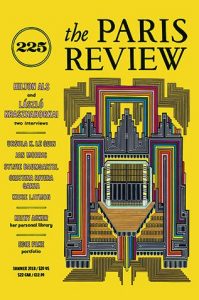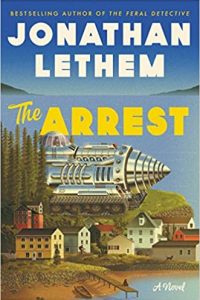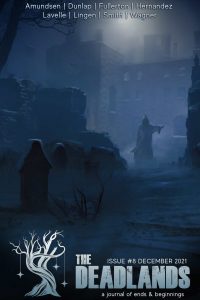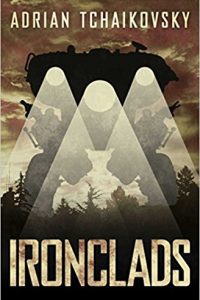Rich Horton Reviews Short Fiction: The Paris Review, New Yorker, Asimov’s, and Analog
 The Paris Review Summer ’18
The Paris Review Summer ’18
New Yorker 6/4-11/18
Asimov’s 7-8/18
Analog 7-8/18
This month Karen Burnham steps in for the late and much-lamented Gardner Dozois, and we’re making changes to ensure Locus covers as much short fiction as possible. We’ve decided to split review sources between three reviewers: this column will cover primarily print magazines and anthologies, Karen will cover primarily online sources, and Paula Guran will continue her focus on dark fiction.
This month, then, let’s begin with two traditional “literary” magazines – for good reason. The Paris Review features a story from the late, much-lamented, Ursula K. Le Guin, “Firelight“. It is, appropriately, a story about her most enduring character, Ged, on his deathbed. Not much I can say about it except that it does not disappoint; it’s very moving – and a quote: “He would go on this time, until he sailed into the other wind. If there were other shores he would come to them….” Tears – of loss, but also celebration.
The New Yorker‘s annual Fiction issue, themed Childhood, includes a striking Karen Russell story, “Orange World“. Like many stories from mainstream sources, it is using its fantastical material in service of a very contemporary story – the narrator is an older woman, pregnant for the first time, and worried about her pregnancy and her baby, so she’ll do anything to keep him safe, including making a deal with a devil. Who is a real devil (if not the Devil), and preys on her horribly, until she finds a group for new mothers, which includes some women who have dealt with similar creatures. It’s funny and scary and dead honest – strong work from one of the best writers to regularly straddle genre borderlines.
Analog’s latest issue features an Andy Duncan story, “New Frontiers of the Mind“, that probably isn’t SF, but which is about a pretty significant figure in the history of SF and indeed of Analog: John W. Campbell, Jr. It’s well known that Campbell, while a student at Duke, participated in J.B. Rhine’s early investigations of ESP. This story imagines Campbell’s interactions with Rhine (in this case, an implausible early success), and also the marriages of both Campbell and Rhine (whose wife had a significant role in his researches). It’s a pretty affecting portrait of both couples, and of the obsessions of both men. I was also impressed by a Spanish story (translated by Rich Larson), Eduardo Vaquerizo‘s “Render Unto Caesar“, a perhaps a bit overwrought examination of the future of the Catholic Church, entwining a novel (if rather grotesque) way of increasing the Catholic population with a dark examination of the child abuse scandal.
The purest SF story in the issue is “Left to Take the Lead” by Marissa Lingen, another in her extended sequence of pieces set in a heavily populated Solar System. Holly is a woman from the Oort, forced into being an indentured worker after a catastrophe (the subject of an earlier story) cost her family their home. She is working on a farm near Edmonton, with a good Earth family, and a fellow indenture who becomes a friend. The story turns on the struggles of the rest of her family to make enough money to get everyone together again, and Holly’s struggles to adapt to Earth life. (Plus there’s a bit about hockey (Martian hockey), because Marissa Lingen!) This is solid work in what is becoming a really impressive series dealing with very interesting ideas about the social and economic order of this Solar System.
I mentioned above the tendency of mainstream writers to use SF as a way of dealing with contemporary issues, but of course that has long been an aspect of in-genre SF as well. For example, Dale Bailey‘s “Rules of Biology“, in the July-August Asimov’s, concerns Anthony Esterman, who has left his wife and then met another woman. He’s also left his daughter, of course, except for occasional visits, and it seems his wife is seeing another man. Nothing wrong with that, of course, but in this world, a man who acts as a true father to a child can literally become that child’s father – and so we see Esterman’s distress at the very literal loss of his child. Pretty effective stuff.
Michael Cassutt‘s “Unter” takes an interesting angle on a somewhat familiar SF notion – people serving as hosts while others take over their bodies, in this case for mostly what might be called “tourism”. For example, Drake Randle has just seen a concert by someone he’d never have bothered with, an old English guy named Eric (Clapton, one assumes?) But Drake is kind of drifting, to his mother’s distress. And he gets curious about who’s using his body… which leads him to a dodgy search for that person. The results are totally unexpected – and the reaction to his actions is pretty scary. Next step? Perhaps an attempt to sabotage the Unter servers? All that leads him to a quite unexpected revelation, though. This is interesting work, if at the end I wasn’t quite believing it.
Ian R. MacLeod, in “Ephemera“, shows us a library of much of humanity’s artistic legacy, preserved on a satellite orbiting an Earth destroyed by nuclear war. The teller is KAT, a robot AI caretaker. KAT has been hoping for contact with any survivors or their descendants for about a millennium, while indulging in her favorites, like Jane Austen. And then there is a signal – but the entity that’s communicating is not at all what KAT had expected. Much of the story seemed rather too routine to me – we’ve seen all this, in some form or another, for a long time, though rarely quite as skillfully executed as here. Fortunately, MacLeod elevates the story to another level in a moving conclusion.
Jack Skillingstead‘s “Straconia” is an effective, sort of Kafkaesque look at a man drifting though life, not much engaged with his marriage, who mysteriously ends up in the title city, struggling to deal with its very strange rules. He tries to find a way back – but, well, I mentioned Kafka. (I should also note that somehow the story reminded me as well of Gene Wolfe’s great early novella “Forlesen”.) And, finally, don’t miss “Attachment Unavailable” by Leah Cypess, a short and sharply funny story told as a comment thread from a social media group of new parents, discussing the offer of some aliens to help their babies sleep better.
Recommended Stories
“Unter”, Michael Cassutt (Asimov’s 7-8/18)
“Attachment Unavailable”, Leah Cypess (Asimov’s 7-8/18)
“New Frontiers of the Mind”, Andy Duncan (Analog 7-8/18)
“Firelight”, Ursula K. Le Guin (The Paris Review Summer ’18)
“Left to Take the Lead”, Marissa Lingen (Analog 7-8/18)
“Orange World”, Karen Russell (New Yorker 6/4-11/18)
“Straconia”, Jack Skillingstead (Asimov’s 7-8/18)
Rich Horton works for a major aerospace company in St. Louis MO. He has published over a dozen anthologies, including the yearly series The Year’s Best Science Fiction and Fantasy from Prime Books, and he is the Reprint Editor for Lightspeed Magazine. He contributes articles and reviews on SF and SF history to numerous publications.
This review and more like it in the August 2018 issue of Locus.
 While you are here, please take a moment to support Locus with a one-time or recurring donation. We rely on reader donations to keep the magazine and site going, and would like to keep the site paywall free, but WE NEED YOUR FINANCIAL SUPPORT to continue quality coverage of the science fiction and fantasy field.
While you are here, please take a moment to support Locus with a one-time or recurring donation. We rely on reader donations to keep the magazine and site going, and would like to keep the site paywall free, but WE NEED YOUR FINANCIAL SUPPORT to continue quality coverage of the science fiction and fantasy field.






